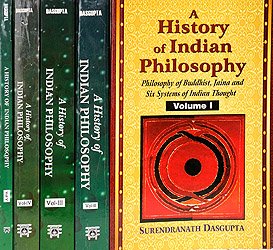A History of Indian Philosophy Volume 1
by Surendranath Dasgupta | 1922 | 212,082 words | ISBN-13: 9788120804081
This page describes the philosophy of comprehension of the philosophical issues more essential than the dialectic of controversy: a concept having historical value dating from ancient India. This is the first part in the series called the “the shankara school of vedanta”, originally composed by Surendranath Dasgupta in the early 20th century.
Part 1 - Comprehension of the philosophical Issues more essential than the Dialectic of controversy
Pramāṇa in Sanskrit signifies the means and the movement by which knowledge is acquired, pramātā means the subject or the knower who cognizes, pramā the result of pramāṇa—right knowledge, prameya the object of knowedge, and prāmāṇya the validity of knowledge acquired. The validity of knowledge is sometimes used in the sense of the faithfulness of knowledge to its object, and sometimes in the sense of an inner notion of validity in the mind of the subject—the knower (that his perceptions are true), which moves him to work in accordance with his perceptions to adapt himself to his environment for the attainment of pleasurable and the avoidance of painful things. The question wherein consists the prāmāṇya of knowledge has not only an epistemological and psychological bearing but a metaphysical one also. It contains on one side a theory of knowledge based on an analysis of psychological experience, and on the other indicates a metaphysical situation consistent with the theory of knowledge.
All the different schools tried to justify a theory of knowledge by an appeal to the analysis and interpretation of experience which the others sometimes ignored or sometimes regarded as unimportant. The thinkers of different schools were accustomed often to meet together and defeat one another in actual debates, and the result of these debates was frequently very important in determining the prestige of any school of thought. If a Buddhist for example could defeat a great Nyāya or Mīmāṃsā thinker in a great public debate attended by many learned scholars from different parts of the country, his fame at once spread all over the country and he could probably secure a large number of followers on the spot. Extensive tours of disputation were often undertaken by great masters all over the country for the purpose of defeating the teachers of the opposite schools and of securing adherents to their own.
These debates were therefore not generally conducted merely in a passionless philosophical mood with the object of arriving at the truth but in order to inflict a defeat on opponents and to establish the ascendency of some particular school of thought. It was often a sense of personal victory and of the victory of the school of thought to which the debater adhered that led him to pursue the debate. Advanced Sanskrit philosophical works give us a picture of the attitude of mind of these debaters and we find that most of these debates attempt to criticize the different schools of thinkers by exposing their inconsistencies and self-contradictions by close dialectical reasoning, anticipating the answers of the opponent, asking him to define his statements, and ultimately proving that his theory was inconsistent, led to contradictions, and was opposed to the testimony of experience.
In reading an advanced work on Indian philosophy in the original, a student has to pass through an interminable series of dialectic arguments, and negative criticisms (to thwart opponents) sometimes called vitaṇḍā , before he can come to the root of the quarrel, the real philosophical divergence. All the resources of the arts of controversy find full play for silencing the opponent before the final philosophical answer is given. But to a modern student of philosophy, who belongs to no party and is consequently indifferent to the respective victory of either side, the most important thing is the comprehension of the different aspects from which the problem of the theory of knowledge and its associated metaphysical theory was looked at by the philosophers, and also a clear understanding of the deficiency of each view, the value of the mutual criticisms, the speculations on the experience of each school, their analysis, and their net contribution to philosophy.
With Vedānta we come to an end of the present volume, and it may not be out of place here to make a brief survey of the main conflicting theories from the point of view of the theory of knowledge, in order to indicate the position of the Vedānta of the Śaṅkara school in the field of Indian philosophy so far as we have traversed it. I shall therefore now try to lay before my readers the solution of the theory of knowledge (Pramāṇavāda) reached by some of the main schools of thought. Their relations to the solution offered by the Śaṅkara Vedānta will also be dealt with, as we shall attempt to sketch the views of the Vedānta later on in this chapter.
